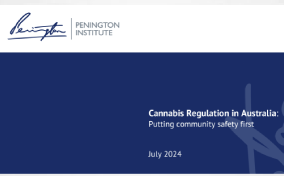The weary tone starts coming through in the first sentence of the executive summary!
Executive summary
Australia is in dire need of drug policy reform. Dangerous drugs are freely circulating — around the world, new ones emerge every other day — overdose rates are on the rise, and the police are unable to contain the billion-dollar industry run by large-scale criminal organisations (see Section 3.1).
The current policy approach to cannabis is a three-fold disaster:
- Huge profits from the $5 billion illicit cannabis market feed into the broader criminal economy, and police operations against dangerous criminal networks routinely reveal these groups’ participation in cannabis cultivation and distribution (see Section 3.3).
- The bulk of cannabis-related arrests, however, are for small-time personal use offences (see Section 4.1.2), depleting resources that could otherwise address serious crime ranging from family violence to the activities of criminal syndicates supplying more harmful illicit drugs (see Section 3.1).
- The uncontrolled drug market imposes a wide range of harms upon individuals, the community, and society more broadly.
The evidence is in. An estimated 2.2 million people report being the victim of illicit drug-related incidents, abuse, or intimidation (see Section 2.3.2). Research by KPMG and Rethink Addiction estimates $12.9 billion in losses to the economy and productivity due to drug use (see Section 2.3.2). Drug-induced deaths took the lives of at least 37,724 Australians between 2001 and 2021. Although anti-drug law enforcement costs upwards of $3.5 billion per annum, the data indicates that an enforcement-led approach has failed to prevent both a rising overdose death rate and the increasing availability of an array of illicit drugs (see Sections 2.2 and 2.3.2).
Despite its relative geographic isolation, Australia’s wealth and demand for drugs makes it an important market for international drug trafficking networks. According to the Australian Federal Police (AFP), as of 2022, Australia was a destination for cocaine produced in the Andes, heroin made in Southeast and Southwest Asia, MDMA manufactured in Europe, and methamphetamine originating in China, Myanmar, and Mexico (see Section 3.1).
The international community, including jurisdictions from the US and Canada, has changed direction by taking cannabis out of the illicit drug equation. A regulated adult-use cannabis market allows consumers to buy from regulated access points, leading to diminished criminal markets and better community health and safety (see Section 5.2). For cannabis, regulation offers greater benefits than decriminalisation, which fails to address the criminal supply of drugs and the toxicity of unregulated products.
Australia’s approach to medicinal cannabis exemplifies these benefits: regulated medicinal cannabis products are free from harmful contaminants, are of a known potency, and their use is tracked and controlled by governments. Regardless of the purpose for using cannabis, the benefits of a regulated framework are clear.
The benefits of regulated cannabis supply can extend to a reduction in clearance rates for violent crime, without producing greater youth consumption. In fact, a regulated cannabis market can support the elimination of child focused candy-like edible products (see Section 5.2). Communities in jurisdictions with a regulated cannabis market overwhelmingly regard such policy reform in successful terms (see Section 5.3). 5
There is now a wealth of evidence and research from a variety of jurisdictions that show the benefits of a regulated cannabis market (see Sections 5.2 and 5.3). By integrating evidence from other jurisdictions and creating objectives aligned with the Australian context and community priorities, we can implement a viable regulated cannabis model that will protect community health and welfare.
Such a model would be guided by the need to protect health, limit underage access, assure quality and safety, and reduce misdirected government expenditure, thereby freeing resources and personnel in the fields of health, law enforcement, and community support. It would create wide-ranging economic benefits by facilitating the development of a legal, regulated industry that creates new jobs, businesses, and tax revenue.
This discussion paper addresses the evidence on Australia’s uncontrolled drug trade, the characteristics of the criminal cannabis market, and the associated economic, human, and social harms. It includes international research on the drug trade, and the positive impact of a regulated cannabis market. Its conclusion is that regulating adult access to cannabis represents a sensible and achievable policy reform, already supported by the community and public at large. It has become a responsibility on the part of policymakers to acknowledge the evidence and make a positive difference.
PEN-Cannabis-Regulation-Paper-July-2024


















